Paddock Family History & Genealogy
Paddock Last Name History & Origin
AddHistory
We don't have any information on the history of the Paddock name. Have information to share?
Name Origin
We don't have any information on the origins of the Paddock name. Have information to share?
Spellings & Pronunciations
We don't have any alternate spellings or pronunciation information on the Paddock name. Have information to share?
Nationality & Ethnicity
We don't have any information on the nationality / ethnicity of the Paddock name. Have information to share?
Famous People named Paddock
Are there famous people from the Paddock family? Share their story.
Early Paddocks
These are the earliest records we have of the Paddock family.

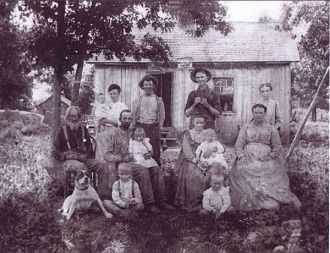
Paddock Family Members
Paddock Family Photos
Discover Paddock family photos shared by the community. These photos contain people and places related to the Paddock last name.

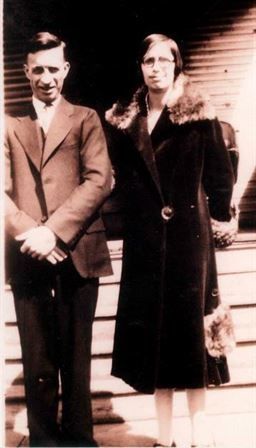
Her family includes the following:
Parents:
David Eli Clark
1876–1961 • L8Y1-M52 (familysearch.org PID)
Sarah Edna Dutton
1877–1950 • 997K-NS6
Marriage: 7 October 1896
Marion, Ohio, United States
Siblings (6)
Clifford Seth Dutton Clark
1898–1985 • L8YT-V76
Ferne Gail Leona Clark (self)
1899–1987 • LDJ6-TSQ
Meda Amelia Letitia "Mege" Clark
1903–1974 • LDJ6-TCQ
John Marvin Clark
1905–1977 • LDJ6-T2X
Frances Dorothy Clark
1907–1993 • LDJ6-1FZ
Magdalene Belle Clark
1916–1997 • LDJX-C79
Rena Eloise Clark
1922–2004 • LDJX-8Y3
Husbands and children:
Edward William Drollinger
1892–1975 • LQRC-G9K
Children (4)
Betty Jane Drollinger
1920–2011 • L6KT-2QB
Mary Alice Drollinger
1922–1996 • LJ23-VWV
William Lewis Drollinger
1926–2016 • L6KT-TWM
Robert Eugene Drollinger
1931–Living • L6KT-YWQ
Second Husband:
Leeland Hiram Paddock
1888–1969 • L2GS-6SQ
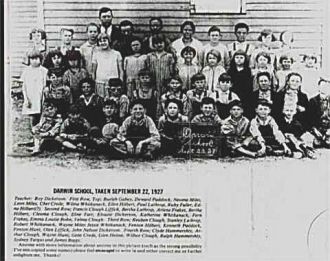
People in photo include: Buelah Gabey, Deward Paddock, Neoma Miles, Leon Miles, Chet Crede, Wilma Whitkanack, Ellen Hilbert, Ruby Fuller, Edna Hilbert, Francis Clough Liffick, Bertha Lathrop, Ariena Frakes, Bertha Hilbert, Cleoma Clough, Eline Farr, Elouise Dickerson, Katherine Whitkanack, Fern Frakes, Emma Louise Bohn, Velma Clough, Reuben Clough, Stanley Lathrop, Robert Whitkanack, Wayne Miles Jesse Whitkanack, Fenton Hilbert, Kenneth Paddock, Fenton Hunt, Olen Liffick, John Nelson Dickerson, Clyde Hammershly, Arthur Clough, Wayne Hunt, Gene Crede, Glen Heline, Wilbor Clough, Ralph Hammershly, Sydney Yargus, and James Baggs

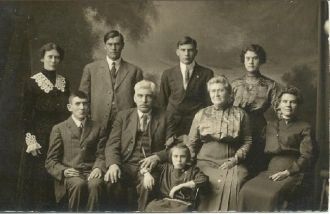

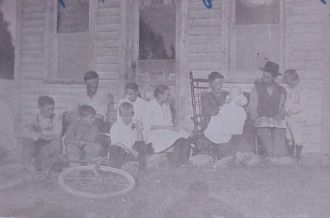
People in photo include: Leroy Paddock, Flossie Paddock, Julia Paddock, and Virgil Paddock


People in photo include: Rosa Brown
Paddock Family Tree
Discover the most common names, oldest records and life expectancy of people with the last name Paddock.
Updated Paddock Biographies
Popular Paddock Biographies















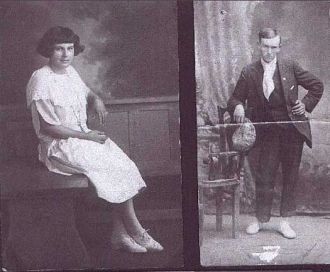

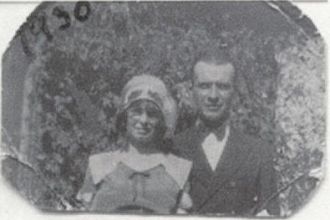
Paddock Death Records & Life Expectancy
The average age of a Paddock family member is 74.0 years old according to our database of 2,216 people with the last name Paddock that have a birth and death date listed.
Life Expectancy
Oldest Paddocks
These are the longest-lived members of the Paddock family on AncientFaces.
Other Paddock Records
Share memories about your Paddock family
Leave comments and ask questions related to the Paddock family.
 Wayne Paddack
Wayne Paddack Followers & Sources




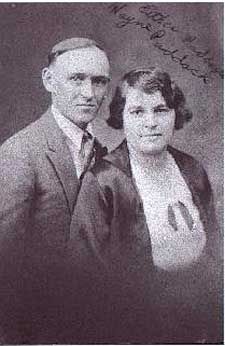
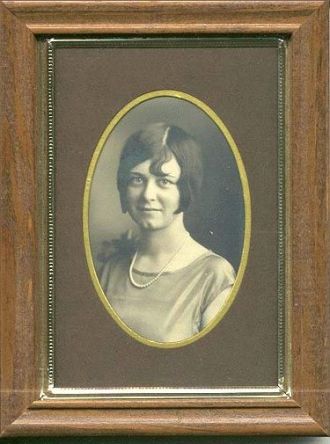
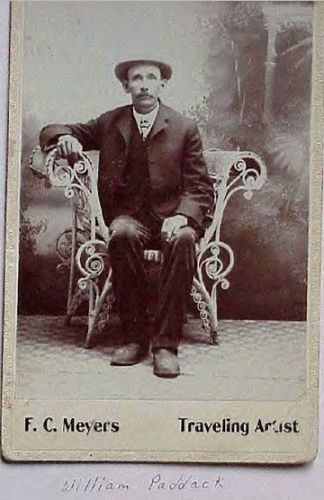
THE WAGON TRIP FROM FISHER, ILLINOIS TO SCHOFIELD, WISCONSIN 1916
By Pearl (Paddock) Brenton
I was born in Illinois and lived there till I was 12 yrs. Old, being under Drs. care off and on, from baby-hood, for ear trouble and tonsillitis. Then the Dr. advised either an operation or change climates. My parents did not believe in operations so decided on a different climate. They sold out everything accept furniture and a few chickens, 2 dogs, @ a pet canary
We departed with two wagons, the large one covered with canvas and a spring buggy. We left with 5 horses, Nancy, who was white -black speckled, tied to the back of one of the wagons. (The horse’s names that pulled the wagons, were Bill, who was all white, Daisy was brown & some black, & Nelly & Pansy who were brown. On the side of the covered wagon, painted in black letters, was "moving from Central Ill. to northern Wis." Nellie and Pansy pulled the carriage in which mama and 2 oldest brothers (Wayne & Allen) rode in.
When we got to Sheridan, Ill. We traded the young colt, which we started out with, for a Shetland pony, called Molly. We sold our chickens to an old friend after traveling just a few days as we found it hard to take care of them traveling. Dad had $26.00 in cash to start out with, enough food to last a few days. We brought our pet canary "Tommy: and he did at the age of 13 yrs. We gave our shepherd dog away to a fellow along the road. We traveled 25 days and many interesting and wonderful sights did we see. Met up with lots of nice people. Camped always in barnyards, church and schoolyards and pastures. One Sun. our camp stove which was in the covered wagon caught the canvas on fire and burnt a big hole in it. Another time Nancy (horse) stepped on a nail and had to be doctored. Another time our wagon wheel broke down and had to stop at a blacksmith shop. At Mauston, Wis. We camped in a man's barnyard and staid over Sunday it being Dad's birthday. Mother did her washing there for first time during our trip. (as we had many clothes)
At Mann, Wis. we camped in a man's barn and they coaxed us not to go any further. (We were headed for Ladysmith so they gave us a cook stove and let us use some chairs and we settled down in a 3 room-log cabin for a few months. Dad and 2 oldest brothers (Wayne & Allen) working at haying jobs, sister (Flossie) and I picked strawberries for a neighbor. Then we left there for another small town called March Rapids. Dad and 2 brothers worked in the sawmill. We first moved into an unfinished house way back in the woods, lived there a little while, than moved to another house about 2 miles from there, lived there thru the winter. (There our Nancy horse dropped dead) Than we moved to another small town called Rib Falls. Dad & 2 brothers bought a Pathfinder car, (first car we had) they worked at the sawmill. We lived in a 3-room house, close to a polish family, which us girls made a real "chum" out of the Polish girl. We lived there thru the summer, moved again, to Schofield, first into a "company house", lived there about 1 1/2 months. The men folks worked at sawmill, and then we all took down with the "influenza." Also my Dad's bachelor brother who was staying with us part the time. We moved there the 10th Sept. and the 24th Oct. Dad died of the "flu". After his death we moved to the next house by that one & lived thru the winter, two brothers worked at saw mill. A French lady gave us a pig and 2 chickens. We had to sell our Shetland pony for $30.00 (was offered $175 several different times before but refused to sell her than) to live on.
Than we moved onto a "chicken farm" a mile from Schofield. My oldest brother (Allen) worked at the sawmill. Mother took in washing and sister (Flossie) and I picked strawberries, and scrubbed a neighbor lady's floor for 25 cents each Sat. I worked in a "Pocketbook" factory in Wausau for 3 months. Mother got a nice big start of chickens, bought a pet sheep, 2 pigs and a cow. We also raised canaries and sold them. We lived there a year or so, than moved onto a "Bachelors" farm. Two bachelors owned it "Frank Moore 37" and "Fred Hillsburg 65". We ran the farm on shares, lived there about a year.
Mother got word that her mother (Grandma Brown) was seriously sick, so she took my youngest sister, "Julia" and youngest brother "Virgil" and went to Illinois to take care of Grandma thru her illness. She left I and my sister Flossie and 3 brothers, Allen, Wayne and Leroy, to run the far, but soon after mother was gone, these two bachelors, started abusing us children and they made thins so miserable for us, we had to move off the farm. My oldest brother roamed thru the great woods until he found an old abandoned log shack with 3 tiny rooms in it, se we children moved into the little log shack, which stood way back in the great thick woods alone. The porcupines and snakes had made their home here for years, the floors were badly chewed with big holes in it from the porky's, the snakes were terrible thick all around the house and in the little "clearing" in front of the house, and under the dead logs. We got our water from an old spring down the hill away from the house. We always had to first push back the drowned rats, birds and toads and green scum on the top of the water, to dip our water pail in for water. My oldest brother" Allen" and I were the woodcutters. We took axe and saw and made our own wood to burn. My sister Flossie did the washing. I did most the housework and cooking. My brother Wayne worked in a factory in Wausau, coming home each weekend. Oldest brother got odd jobs here and there. We were rather "hard up" so we went after our share of young calves, which we were suppose to get. They gave us one young calf, we butchered and our "good neighbor" some miles away (Mrs. Shipley) gave us eggs and milk. Before we could find an empty house to move into, this same neighbor took us children in her home for 3 or 4 days.
We lived in the log shack until summer, mother came back (being gone 6 weeks) with my uncle, aunt and their 5 children. So our 3-room shack was not big enough for all. We lived and ate our meals in the log shack, at night we all marched with a lamp in our hand across the old logging road to another "empty house with 4 rooms. It was an unfurnished house; there we made our "beds" on the floor and slept every night, in the morning parading back again for our breakfast in the log shack. So with the 2 houses, we put thru that summer. We all enjoyed ourselves, no rent to pay, and far from civilization, with the snakes, porcupines and many wild animals of the woods, as our neighbors. (what more could we ask for)
Realizing we could not stay thru a winter under such conditions, we moved again to a wreck of a house, 4 rooms, again far into the woods, 2 miles from other neighbors. There my brother Wayne rode a bicycle 5 miles; morning and night to the factory work in
Wausau. My brother Allen got a job in the cheese factory. Mother & I worked every day for a farmer "Harvey Woodward" that raised garden stuff to sell, also picked strawberries for him. Her and I walking thru the woods to our work morning and night. Mother & I became very close pals and we enjoyed the time together on our knees all day long, weeding out small carrots, beets and radishes & onions. Altho dog-tired each night we trudged home, only to sit down to a very slim supper of mostly wild due-berries and bread and gravy. We lived there thru the winter and part of the summer. Once mother took very sick with the "shingles". She very near died one night.
My aunt and family still were living with us. Mother and I had to walk and carry our water a long distance from the house, as the pump was worn out. We got water from a "spring". Each week-end her and I took the 2 family wash down to the spring, build up a fire-place of rocks and do the washing, hanging the clothes on rope lines stretched between trees. Than we moved to a 4-room house a few miles from here, Mother and I picked up potatoes for a farmer, also worked for the farmer that had the garden stuff to sell. Her and I
bought a horse called "Babe" driving morning and night to our work. We lived there thru a winter. Than we moved back to Schofield in a 4 room house upon a hill. There the two oldest brothers worked at different jobs. Than one night both boys met with a car accident, being run over by a car full of drunkards. while the brothers were fixing a flat tire on their car by the roadside. Brother Wayne received a broken leg, which made him a cripple for life. Mother took wash. Than she worked at the Rubber Plant in Wausau. One day she met up with a widower and after a few months court-ship they were married. I and my "boy friend" (I met when I was 12 yrs. old) got married making it a double wedding. I went to live in Fenwood, Wis. (30 miles away form home) husband Tom running a black smith shop there. Sister Flossie married and left the home. My aunt and family left for a home of their own in Schofield.
(Thus ended my child-hood days)
Written by Pearl (Paddock) Brenton (Note: This was typed as written. No changes were made.)
DAILY LOG
Our journey from Illinois to Wisconsin
1st day- Supper at schoolhouse Southwest of Tibson, WI.
2nd day- Breakfast same place, dinner at old church southeast of Harl Anderson's, supper at Hart's.
3rd day- Breakfast at Hart's, dinner at school house 1 mile southwest of Risk, Dl. Supper 5 miles south 2 1/2 miles east of Fairbury, Dl. at the school house.
4th day- Breakfast same place, dinner at school house 1 mile east of Fairbury, Dl. Supper in T. E. Herndon's pasture north Fairbury on the Vermillion River.
5th day- Breakfast same place. Dinner at Com Crib 1 mile west of Swygert. Supper along a big hedge 1 1/2 miles southwest of Odell, Dl.
6th day- Breakfast same place. Dinner at corner 2 miles north of Sencea. Dinner along the road between Nevada and Adams. Supper at schoolhouse 5 miles south of Illinois River.
7th day- Breakfast same place. Dinner at corner 2 miles north of Sencea. Supper at Fox River Church 1 1/2 miles southeast of Norway.
8th day- Breakfast same place. Dinner at comer of road 1 1/2 miles northwest of Sheridan. Supper 6 miles south of Somonauk.
9th day- Breakfast same place. Dinner under a row of maples 1 mile west of Franks. Supper at center school 8 miles south of Dekalb.
10th day-Breakfast same place. Dinner by big dairy farm 2 miles north of Dekalb. Supper at center school 8 miles north of Dekalb.
11th day-Breakfast same place. Dinner along roadside 5 miles northwest of Beloit. Supper at crossroads 7 miles north of Beloit and 7 miles south of Janesville, Wis.
12th day-Breakfast same place. Dinner along roadside 5 miles in Man's pasture.
13th day-Breakfast same place. Dinner same place. Supper same place.
14th day-Breakfast same place. Dinner same place. Supper same place.
15th day-Breakfast same place. Dinner in front yard of a “good woman’s house” about 2 or 3 miles northwest of Evansville. Supper by Frank Newton's 2 1/2 miles south of Argon, Wis.
16th day-Breakfast same place. Dinner and supper same place. (4th of July 1916)
17th day-Breakfast same place. Dinner along roadside 4 miles south of Madison, Wis. Supper on a by-road 10 miles northwest of Madison.
18th day-Breakfast same place. Dinner along road 3 miles southwest of Sauk City, Wis. Supper at church 6 miles northwest of Sauk City and 10 miles southeast of Baraboo.
19th day-Breakfast same place. Dinner along road 2 or 3 miles northwest of Baraboo. Supper at cross roads 5 miles southeast of Reedsburg, Wis.
20th day-Breakfast same place. Dinner on the roadside. Supper at Mr. St. Claire's 10 miles southeast of Maulson.
21st day-Breakfast same place. Dinner didn't eat any. Supper at Mr. Ira Wightman's 3 miles north of Maulson.
22nd day-Breakfast same place. Dinner in the timber 7 miles south of Mecedah. Supper in schoolyard in the timber 4 miles northeast of Mecedah.
23rd day-Breakfast same place. Dinner by Mr. Newton's 11 or 12 miles northeast of Mecedah. Supper in a Marsh 6 or 7 miles south of Babcok. "Couldn't sleep on the account of mosquitoes"
24th day-Breakfast same place. Dinner on a timber road 1 mile north of Dexterville, Wis. Supper in a Man's barnyard 4 miles north of Pittsville.
25th day-Breakfast same place. (Mr. Hollander) Thus ended our traveling. Crossed Illinois River on 7th day. Crossed Wisconsin River on 19th day.
PADDACK FAMILY STORIES
By Julia (Paddock) Craw
I wrote this, or started to, for Gail. I found out from Leroy when he came out here 2 or 3 years ago, that Beverly did come to Wisconsin and lived with Mama and Papa until Papa died. So you see how impossible it would be for me to try to get any kind of records correct from memory after 30 years of deliberately trying to forget. I just remember bits and pieces of Mama told me.
I don't remember Papa. I was only two years old when he died in the flu epidemic of 1918. But the image of Papa is clear even after all these years, through the older brothers and sisters. His was one of obliterate-the memory remains clear to everyone who came in contact with it, the impact remains strong after physical death wherever its influence was felt in life.
So Papa lived on definitely and clearly in the minds and actions of his widow and children. And he became through them a definite personage to me, who never knew him in actuality. The influence of his personality has probably been one of the most important factors in my life, even coming, as it did, entirely second-hand.
Perhaps some of the facts will not be completely accurate and some of the stories may not be completely authentic, but this is Papa, as I know him.
Papa, William Paddack (no middle name) was born July 9, 1870 near the town of Maxville (Mocksville) in the hills of Kentucky.
His mother was Joanne Baker, the oldest girl in a family of nine. Not much more is known except the names of her sisters and brothers, who were, in order of age, Perry, Joanne, Josie, Susie, Frank, Leb (Lebanon?), Parilee, James and Henry. It is thought that Josie and Susie both married Crawfords, Parilee married James Brown.
Great-grandfather Paddack had three boys and one girl, Sam Henry, Allen, John, and Allie. He was Irish and this Irish blood is romanticized in a family legend. The story is that Norah (or Norma), a grandmother or great-grandfather Paddack was a run-away from a wealthy home in Ireland. When she was fourteen years old she stowed away on a ship headed for the new country. How, or if, she arrived in Kentucky is not known about the legend of her journey and of the family inheritance she had a claim on, was powerful enough to be the caused of several family-history searches. The last one was undertaken by Uncle Bev, Papa's younger brother, but, by that time, the trail was too cold, and Norah (or Norma), our courageous and foolhardy female Irish ancestor remains a legend, Passing nothing down to the family but her Irish blood.
All that is known about Allen Paddack is that he was the second son and that he moved to Indiana after he was grown. Papa must have know and liked this uncle rather well, However, since he insisted on his first born being named for him.
The other uncle, John, it was said, was a slave-owner in Kentucky before the Civil War-"but a good man" nevertheless! It was also said that he was active in the Ku Klux Klan movement in the reconstruction years after the war and that he took par in many of the secret acts of retaliation practiced at that time by the suddenly dethroned white southerners. Another part of family legend, true or false.
Aunt Allie, like her Irish ancestry, left home when she was only a slip of a girl to cross-mountains and deserts instead of an ocean to make a new life for her self in a new country. She was sixteen when she married a young man by the name of Moore, who owned nothing but one horse and a lot of
courage. On the day they were married they left the Kentucky hills for the state of Texas, almost two thousand miles and unknown future ahead. He rode in the saddle and she sat astride in back of him and all of their possessions were carried around them: and she remembered Papa as one of the many tow-headed young ones waving good-bye to them as they rode away.
We met Great-aunt Allie Paddack Moore at her daughter's home near Bridgeport, Texas in 1938, a pert, little, dried-out, long-skirted and sun-bonneted lady who was glad to meet the first kinfolk she had seen since leaving Kentucky while insisting she had never been anything but was glad she left. She had worked hard and had seen trouble in Texas. Her husband was long dead, the land they had worked so hard together to claim was lost, she was still working hard caring for grandchildren: but she had only pity for the family she had left behind in the hill, ignorant and poverty stricken, as she knew they must be. She was very glad to hear that "Billy" and his family had left the hills. She was quite old then, and we were the first and very likely the last her family she ever saw.
I never saw the Kentucky hills Papa came from but my brother die, and, since the hills are changeless, he saw the life Papa was born into
The houses are log, the water comes from springs and "runs" carried to the house in "buckets>" Social life is church and visiting. Food is almost entirely home grown with some store-bought sugar and coffee and white flour and kerosene for the lamps. They raise a few pigs, a few chickens, a cow if they can feed one. White corn meal is for eating, yellow corn is hog food; “sweetenin: is home pressed sorghum; the store bought white flour, on Sunday, becomes ”whitenin” for the face. The men pass much of their leisure time sitting on the porches or the pole fences visiting, the women sew and quilt. Many of the women have never married because, if a boy has any ambition at all he leaves the hills as soon as he is grown, and there isn't anyone to marry. When they do they are forced, may times, into inter-marriage and the result is a preponderance of backward and crippled and handicapped children. Poor nutrition and poor schools --or none at all--adds to this problem. So that, in uncle Lev's house where Virgil stayed, there was on girl (middle aged) who was a wheel chair cripple, who was a moron, and the brightest and healthiest one was Ethel and she had one crippled foot. Uncle Leb and his wife were first cousins.
Religion in the hills is based on morality rather than dogma; they live, mostly, by the Ten Commandments, interpreted in the simplest way. H a man is liked they speak of him as having a "good turn;" if he is mean, or cheats, or drinks or fights he has a "bad turn."
Only a few miles separate the hill people from the rich, land-owning people of the valleys but they are as far apart in life as Negro and a white in that country. The hill people go down at harvest time and work in the tobacco fields and the other crops and earn the only money they see form one year to the next. But they never go down to school, or to marry, or to live.
This was the family and the environment Papa came from and it is easier to under-stand some of the things about him knowing this background. A man is the sum of his parts.
Tobacco was a special aversion of his because it was "filthy" at six he was earning money in the valley fields by hunting and squashing the huge, crawling, green tobacco worms and he always declared he knew they hadn't found all of them and the rest had to be rolled into the tobacco.
His passion for horseflesh, in Mama's estimation his worst vice and only extravagance, can be understood, too. He must have viewed the well-fed thorobreds and sleek racers of the valley estates with longing and envy all of his early ears, until a good horse became a status symbol and an unconscious demonstration of human equality--just as a big and shiny car is a necessity for many of the minority groups in this age.
H he never laughed at anyone, never ridiculed an unfortunate, it was because he had seen too many
afflicted through no fault of their own in his own family.
He carried no religion from the hills, as far as 1 know he never attended church; but the moral code held strong. all his life he was a man with a "good turn."
These were some of the things he carried with him from the dry, stony hills of Kentucky to the muddy, flat farms of Illinois the summer he was thirteen. The earliest picture 1 have of him was taken that year before he left. Wearing his Sunday suit and his Sunday shoes (his only shoes) he looks slight, almost scrawny. Bet he sits straight and his light blue eyes are unwavering and confident. He was a man grown, he had been holding his place beside other men in the field for two years, and he was ready to set out in search of a better life.
As he left the hills he carried this confidence in his manhood and he walked tall and held his head high. He never backed down to any man, no matter how big, and he never looked down on one. It wasn't a chip he carried on his shoulder; it was an unshakeable belief in the dignity of man which he was ready to back up in any way necessary from a friendly smile to the knife he carried in his pocket. As far as I ever heard he never used the knife, even as a threat; his smile and personality always seemed to be convincing enough in any argument he had. The knife was probably only a balance for his slightness of stature since he disliked conflict, even his sons were forbidden to scuffle because he had seen a young cousin fatally wounded in a friendly wrestling match with another young cousin. Self-confidence carries its own power, more that equal to any physical weapon, and Papa had that in full.
Papa always believed any man could do anything he set his mind to it and wanted to badly enough. His favorite statement was, "I can do anything but make a baby." Mama, when repeating this, always added, he could have done that if he had had a little of the right kind of help."
He once wanted a hedge puller different from any other he had seen. He went to every blacksmith in the country trying to explain what he wanted made and what he would do with it when it was made and every one of them turned him down. They said they wouldn't waste time on it because it wouldn't work when it was made. Finally he went to one and said, “look, let me use your tools and keep out my way.” I'll do the work and pay you for it." The blacksmith agreed, still saying it was a waste of time but it would be Papa's loss. So it was done and Papa made the puller and used it for two years making a good living with it.
Mama was not so inventive but the best make-do person 1 knew. I've seen her paint with out paint, bake cookies, cakes and lemon pies without lemon juice. Nothing went to waste; it went into something else that was used. Old sheets made dish towels, old dishtowels made cleaning cloths. The good parts of a bath towel were cut into squares and bound on the edge and we had perfect wash cloths. Dishwater, without soap, went into feeding pigs or calves and came out delicious meat in time.
This is the kind of thing survival is made of. Christ said, "Faith will move mountains." But 1 don't think even he meant you should stand and take the mountain away. 1 think he meant you to first have faith that there was a way to move the mountain, and need faith to believe that you could find it. Maybe faith alone will move a mountain--but should it?
Written by Julia (Paddock) Craw (Note: This has been typed as written. No corrections were made)
My most memorable meal.
When I say your Memorable Meal essay contest (July/Aug 1002 issue), I thought right away of entering it. However, I see that the rules require recipes for at least four dishes of the meal to accompany the entry. My meal doesn't meet those guidelines since there was only one dish, and it didn't even have four ingredients (unless you count water!). But nevertheless, it was the best meal of my life and I can still taste it today. And I think that a lot of Reminisce readers would identify with the circumstances of the meal; so I'm offering this story. If not for the contest, then just as a story for its own sake.
My father died in the flu epidemic of 1918 when I was twelve years old. Although northern Wisconsin life wasn't easy in those days, we never went hungry while he was alive. But after he was gone was another story. Mom and I and my six brothers and sisters depended on taking in washing and ironing and the older kids working for other people, just to stay alive. Many times I walked home from school at noon as though to eat my lunch, not because there was any food in my house, but because I didn't want the other kids to know that there wasn't. Once, mom had my oldest brother kill a pig that we'd been raising to sell; and we ate almost that whole pig with no bread, potatoes or vegetables to go with it.
My most memorable Meal occurred during the worst of these times. Mom sent us kids out into the yard to straighten it up, just for something to do. I picked up an old overturned kettle and found a dime underneath. We carried the dime in to mom like it was a million dollars, and let her decide
how best to spend it. She thought for awhile, and finally she sent some of us in to town to by ten cents' worth of suet. With just the suet, some potatoes borrowed from a neighbors garden, and some onions from our own garden, she made a batch of soup that was and still is the best meal I've ever tasted. In the over 70 years since, I've had a lot of fancier meals but no better ones. Of course anything tastes best when you're really hungry, which we certainly were. In fact, if that soup could still taste like it did then, I wouldn't mind having some right now.
Written by Flossie Paddack Phillips (Note: This has been typed as written. No corrections have been made)
My Grandfather William Paddack
When he was 13 he went to work in the tobacco fields picking worms off the plants. The rest of his life he hated tobacco- also alcohol. My Grandmother told of a man in a drunken stupor (I assume they checked!) who passed out in front of their house one cold night and my Grandfather refused to help him. My grandmother worried all night they would find him dead but the next morning he was gone.
Grandpa also slept with a rifle beside the bed and one night he awoke, saw something strange at the foot of the bed, grabbed the gun and was ready to last away hen my grandmother stopped him. What he had seen was his own foot sticking out from the covers.
He never wet to school, was illiterate, but could figure up long columns of numbers in his head faster that others could on piper. He was quite inventive, devising better tools for his work.
I've heard that one of the things he did to make a living was break wild horses shipped east after being rounded up out West.
Rose Anna Sims
She had a very hard life, mainly because her husbands kept dying. (I've heard the last one 'Brown" deserted her.) To provide herself and children she took in washing for the better off. This was; of course, a miserable way to make a living back then with only wash boards and irons heated on a wood stove. My grandmother said it was made more difficult by the frilly, elaborate styles. Even little boy’s clothes were ruffly, elaborate styles. However, people did seem to make extra work for themselves. I can remember my grandmother ironing the rags used for cleaning and mopping the floors because that was how her mother did it. Rose Sims was, according to my grandmother, a patient, basically good woman.
Written by Unknown Paddack (Note: This has been typed as written. No corrections have been made.)
Wagon Trip from Fisher, Illinois to Schofield, Wisconsin
We began our journey to Wis. about June first of 1916, immediately after the close of school. Our traveling gear consisted of one heavy wagon with wide rack and heavy canvas cover in which we carried our household furnishings including one fifty-gallon barrel of home made molasses. Also a double seat buggy with top. The wagon was arranged so that we could use the center for sleeping space.
Dad drove the wagon while Allen and I changed off driving the buggy. At times when it was real nice weather Mom would ride with us for the change. The younger kids seemed to prefer the wagon most of the time.
We had a team of western horses for each rig. Also ha a young mare about 11/2 years old. Dad traded this filly for nice black Shetland pony shortly after we entered Wis. We had only about $50 in cash when we started so had to be very careful of expenses. We covered twenty to thirty miles a day depending on the weather and road conditions.
Did our camping in schoolyards or in open fields along the road mostly. However there were a few times when we were asked to camp in some farmyard. The people that we encountered along the way were just about what you would expect to be. Some were very friendly and helpful while other's shunned us as if we were something vile. Some of the farmer's would not even allow us to water the horses for fear of disease while other's invited us to stop for the night where we could have water and privacy.
We were never really molested on the way. However, one night when we had camped at a schoolhouse there were tow men who came snooping around. They did not stay long as we had a huge bulldog of more than a hundred pounds and a full-grown shepherd. Both of them knew very well what "sic-em" meant. We just promised the curious two that if they didn't leave we would let the dogs loose. They left and did not come back.
I can recall passing thru Rockford. We had a following of children and curious citizens like a circus parade. Naturally we were given much good advice and quite a little hurrahing. Dad and we boys were offered work many times along the way but Dad had set out for northern Wis. and just kept going. At Madison we passed directly by the State Capitol Square. A real thrill for all of us.
Those were disagreeable times too. I recall one night when we stopped to camp in an open field that looked real nice with lots of long grass for the horses turned out to be a dreadful trap. Shortly after dark the air became literally full of mosquitoes. We tried to drive them away with smudges but the smoke just seemed to anger them into more viscous attacks. Believe me we were all happy for sunrise to come and quit the beggar's.
Allan and I were given an invitation to go swimming one lovely day. We crossed the Wis. River near Prarie du Sac. A group of young (ladies?) in swimming there asked us to come in with them. We had no suits so did not accept. I have often thought since that maybe we would have been dressed exactly as they were since not on of them showed more that their face and hands above water.
Near Mauston, Wis. we spent a couple days in the farmyard of the St. Clair family. They had a small blacksmith shop and we were allowed to use it to make some needed repairs. They were real friendly and helpful and begged us to keep in touch with them, which the family still does.
We arrived at Marshfield on July 3rd and being almost broke and tired of moving steadily we took work with a farmer who needed help with his harvest. He dad a log cabin which we used until early fall. Then we moved to March Rapids which was a small sawmill town. Dad, Allen and I all went to work there. It was there that my baby sister was born on the 11th of July 1917. The only Badger in a family of Sucker's.
And here ends the tale of the wandering Paddack's. I mean except you of course.
Written by Wayne R. Paddack Sr. (Note: This has been typed as written. No corrections have been made. It was written at the request of Gail Craw, daughter of Julia)